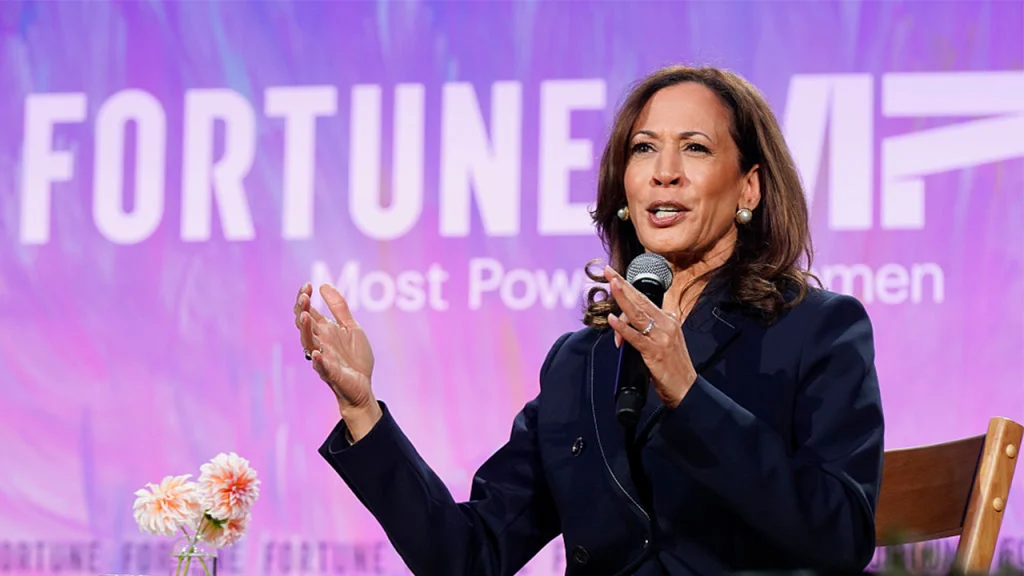Harris Reflects on Biden’s Missed Opportunity with Elon Musk
In a candid revelation that sheds light on the complex dynamics between technology innovators and political leadership, former Vice President Kamala Harris has acknowledged that the Biden administration made a “big mistake” by excluding Tesla CEO Elon Musk from a significant White House electric vehicle summit in 2021. Speaking at Fortune’s Most Powerful Women Summit in Washington, D.C., Harris reflected on the decision that may have had lasting political consequences. “I mean, here he is, the major American manufacturer of extraordinary innovation in this space,” Harris said, highlighting the contradiction of omitting the leader of America’s foremost electric vehicle company from a discussion about the future of EVs. The admission, which also appears in her memoir “107 Days,” points to a strategic misstep that potentially alienated one of the world’s most influential business leaders.
The 2021 White House event showcased executives from traditional auto manufacturers General Motors, Ford, and Stellantis, while notably leaving out Tesla, the company that had pioneered and dominated the electric vehicle market. This decision was widely interpreted as a political gesture supporting unionized labor, with then-White House Press Secretary Jen Psaki emphasizing that the event featured “the three largest employers of the United Auto Workers.” The implicit message was clear: Tesla’s non-unionized workforce put it at odds with the administration’s pro-labor stance. However, Harris questioned the wisdom of this approach, writing in her book that while Biden was “sending a message about Musk’s anti-union stance,” excluding the industry leader “simply doesn’t make sense.” This tension between supporting organized labor and recognizing technological innovation represents a fundamental challenge for political leaders trying to balance competing priorities.
Musk’s reaction to the snub was swift and public, marking what would become an increasingly adversarial relationship with the Biden administration. “Yeah, seems odd that Tesla wasn’t invited,” he posted on social media at the time, later suggesting the administration was “controlled by unions” and “not the friendliest administration.” According to Harris, this exclusion had profound consequences: “I have to assume that that was something that hit him hard and had an impact on his perspective.” Her assessment appears accurate, as subsequent attempts by administration officials to apologize and smooth over the relationship proved ineffective. The Wall Street Journal reported that despite offers of reconciliation from Biden’s team, the damage had already been done. Harris summarized the fallout in her memoir with the simple observation: “Musk never forgave it.”
The political consequences of this broken relationship became evident during the 2024 election cycle, when Musk emerged as one of former President Donald Trump’s most significant supporters, both through his public endorsement and an estimated $300 million contribution to Republican campaign efforts. This dramatic shift highlights how personal slights in the political arena can have far-reaching implications beyond the immediate context. For Harris, this serves as a cautionary tale about the importance of engaging with innovators across political and ideological lines. “Presidents should put aside political loyalties when it comes to recognizing technological innovation,” she stated at the Fortune summit, suggesting a more inclusive approach that values achievement regardless of partisan alignment.
The episode reveals a broader tension in American politics between traditional Democratic Party constituencies, such as organized labor, and the new power centers emerging from technological innovation. The Biden administration’s decision prioritized its long-standing relationship with unions, particularly the United Auto Workers, over building bridges with the electric vehicle revolution’s leader. Harris’s willingness to critique this choice reflects her recognition that the future of American manufacturing and innovation may require more flexible political coalitions. It also suggests that she sees value in distinguishing her perspective from the administration in which she served, highlighting areas where she would have taken a different approach.
As the landscape of American industry continues to evolve, with companies like Tesla leading transformations in transportation, energy, and space exploration, political leaders face difficult choices about how to balance traditional economic interests with emerging technologies. Harris’s reflection on the Musk snub demonstrates an understanding that technological innovation often transcends conventional political categories. Her admission that excluding Musk was a “big mistake” may signal a more pragmatic approach to engaging with business leaders who don’t fit neatly into partisan boxes. Whether this perspective represents a meaningful shift in how Democrats might approach the technology sector in the future remains to be seen, but Harris’s candor suggests at least one prominent leader has learned from the experience.















